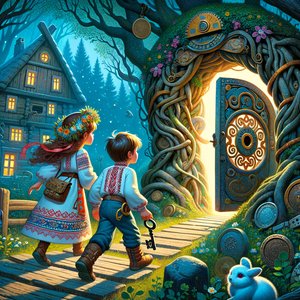The Fern Flower Key

By day, the river Cheremush ran laughing over stones and through the alder roots, and the wooden roofs of Zoryany shone like beetle wings in the sun. Birch trunks stood in little white armies along the hillside, and the onion dome of the church caught every sky-colour-blue in the morning, gold at noon, rose at dusk. In Zoryany, even the wind knew the names of children.
Nadia knew the wind's tricks, too. At eleven, she was quicker than a chicken and quieter than a stone. She could pinch a blueberry without breaking its skin and could tell, just by the touch of the air on her cheek, whether the river would be high or low by evening. Her cousin Luka, a year older and a head taller, preferred to race the goats, clatter over bridges, and come home with his knees decorated by adventures.
They had a friend no one spoke of loudly-the domovyk. Some called him trouble, some called him luck, but he lived in the warm shadow of Babusia Halyna's clay stove either way. Nadia had seen him first one winter night, a whisk of soot and whiskers and the shine of button eyes peeking from the ash door. Now, on the day the sun would hardly set at all, she saw him again while she swept the kitchen.
"Panko," Nadia whispered, because the house spirit liked courtesy. "You've singed your eyebrows again."
The domovyk Panko fluffed himself and slapped his mitteny hands together, sending up a sneeze of flour from the table. A round, gray-cat sort of creature, he had the grumpiest moustache Nadia had ever admired. Waggling one finger, he pointed to a loose brick at the base of the stove and nodded so hard his hat-a little scrap of brown felt-tipped over one ear.
Nadia slid the brick aside, expecting a mouse, perhaps a gleam of sugar. Instead her hand closed on iron. She drew out a key as long as her palm, old as a story, cold as river stones. Its loop was shaped like a fern frond curled in sleep. The shaft had tiny notches, like teeth that had learned to smile a certain way and never another.
"For me?" she breathed.
Panko made a sound like a kettle beginning to boil. He shook his head, then nodded, then tucked his hands beneath his armpits and rocked on his heels. "Keys open and close, little dove," he rasped in a voice that always seemed to come from the wood itself. "Some doors like to be left alone. Some doors get lonely."
Before Nadia could ask which it was, Babusia Halyna swept in with a basket of willow and wildflowers. The old woman's braid was as silver as the river when it showed its belly to the moon, and her eyes saw everything.
"Wreaths, my sunflowers," Babusia declared. "Tonight is Kupala Night. We dance, we sing, we give the river our hopes, and we mind the old rules."
Luka dropped a handful of thyme onto the table. "What rules this time? No whistles at the table? No running with scythes?" He tried to look solemn; it lasted as long as a soap bubble.
"The forest does not like shouting," Babusia said, easing down the basket. She laid a long embroidered cloth-her best rushnyk-across the table. Red and black threads ran through it in diamonds and flowers and a small fern at one corner. "If you go to the old grove, step lightly. Do not break what you do not have to. If you see the fern flower-" Here, her voice softened. "If you see it bloom, it will be for a breath and no more. Do not boast. Do not look back until you are safe. The leshy hears everything on this night."
Nadia's fingers went to the key in her pocket without her meaning to, feeling the curl of the fern loop. "Does it really bloom?" she asked. "A flower from a fern that never makes flowers?"
Babusia's mouth curved. "Some things are shy until the right night."
By dusk, the hillside clearing was a ring of footsteps around a bonfire stacked as carefully as hay for winter. Fiddles and a three-stringed instrument chattered in the hands of men who never seemed to tire. The younger children, hair sprouting wreaths of daisies and cornflowers, leaped the little flames at the edge and came away with singed hems and laughing eyes. Old Petro told a story about the Silver Stag, the one that only shows itself when the stars forget to blink. Nobody said they believed him. Everyone listened anyway.
Nadia's wreath-slender willow, clover, and one blue cornflower that grew where the ground never dried-was the last she tucked into the basket. Without thinking, she had tied the fern-shaped key into a fold of Babusia's rushnyk and made a hidden wick beneath the willow. It felt right, like buttoning a coat before the wind turns.
Down at the water, the river gathered the lantern lights and wore them like a sash. The moon laid a path on the Cheremush for anyone brave enough to step. One by one, the girls and boys set their wreaths afloat and watched to see where hope would choose to go-left or right, swift or slow. The current took Luka's wreath and flipped it once, as if the river winked at him, then sent it spinning toward the bend.
Nadia knelt and lowered hers, the damp kissing her fingers. For a heartbeat, her wreath drifted with the others, a small green ship with petals for sails. Then it hiccupped, turned, and began to slide upstream.
"Hey," Luka whispered, leaning close. "Nadia-do you see?"
The Cheremush did not run backward. It never did. But the wreath's willow twigs quivered as if pulled by an invisible thread, and a pale glow bloomed beneath it. Not the moon. Not a lantern. The glow moved with purpose, soft and sure.
From the far bank, the bell of the drowned chapel rang once, just enough to prick the hairs along Nadia's arms. There had been no chapel in the water for fifty years, only stories about one lost in a spring flood. The note threaded the air anyway, as light and sad as a sigh.
"Petro's stag," someone murmured upriver. Laughter followed, but it was the kind of laughter people make to keep brave.
Nadia's pocket warmed. She pressed her hand to it and felt the iron key stir as if it had taken a breath. Panko's warning rattled inside her like a pebble in a jar. Some doors like to be left alone. Some doors get lonely.
"We're only going to the bend," she told Luka, because saying the plan aloud made it smaller and the night less huge. "Then we'll come right back."
They slipped along the path between the alders, the bonfire a moving shadow behind them. Fireflies gathered as if called, drifting ahead in a scatter of silent stars. The air changed by degrees the way water changes before a waterfall-cooler and too steady-and all the scents sharpened: wet bark, fern, something like apples kept in a cellar.
At the bend, the river widened into a chalky moon-pond, slow and polite under the birches. Nadia's wreath glided into a little eddy that hadn't been there in daylight. The eddy held it like a hand. The pale glow under the water tightened into a coin of light and then thinned out again, like a smile that couldn't decide whether to be shy or brave.
Across the water, between two alders, something stood very still. At first Nadia thought it was a tree where there hadn't been one. Then the tree blinked. Antlers held up the night, not mere branches but a crown woven from lightning and spring. The shape did not toss its head or stamp. It simply watched and breathed. For a heartbeat, the wind forgot to move.
"Do you see it?" Luka's voice came out too small. He edged closer until his sleeve brushed Nadia's, and the brush said more than his words.
The key heated until she could not ignore it. It tugged, a fish on an old line, not to the water but to the birch grove just upslope. Nadia looked, and the grove looked back. One tree in the middle wore a wick in its shoulder the size of her hand, shaped like an eye or like the fern curl on the key, the same spiral that slept in the corner of Babusia's rushnyk.
"No names on the path," the reeds hissed. Or it was only the water licking itself. Nadia clapped her mouth shut anyway.
She drew the rushnyk from her pocket, careful not to untie the hidden knot that cradled the iron. The embroidered fern glowed the tiniest bit, as if the thread remembered a summer no one had lived. She held the cloth up to the shoulder knot of the tree. The patterns matched so neatly that the hair on her neck prickled.
The iron key thrummed in her hand. From the far slope came a sound like hoof steps in deep moss-one, two-then quiet again. Panko's hat tipped in her memory. Some doors get lonely.
Nadia laid the key's fern loop against the bark knot. For a moment, nothing happened but the normal sighs of the river and the patient chitter of crickets. Then the birch shivered. A line appeared in the trunk, thin as a thread at first, then widening into a seam of light. The white bark breathed cold into their faces, winter and apples and something older.
"Nadia," Luka whispered, not quite a question, not quite a warning.
On the water, her wreath tilted and stilled, as if waiting to see what she would do. The seam of light widened like a mouth getting ready to speak. From within came the soft scrape of something that could have been a hoof upon wood, or a hand brushing a wall in the dark.
The door in the birch began to open.
Autor zakończenia:

 English
English
 polski
polski
 Co było dalej?
Co było dalej?



